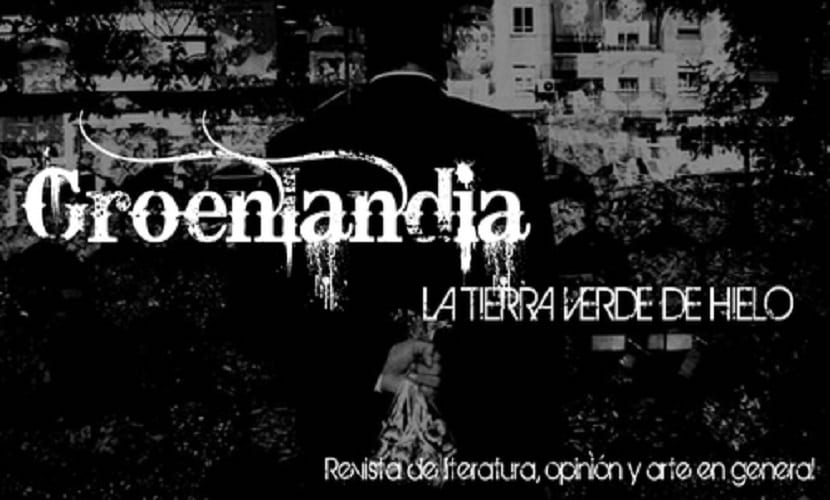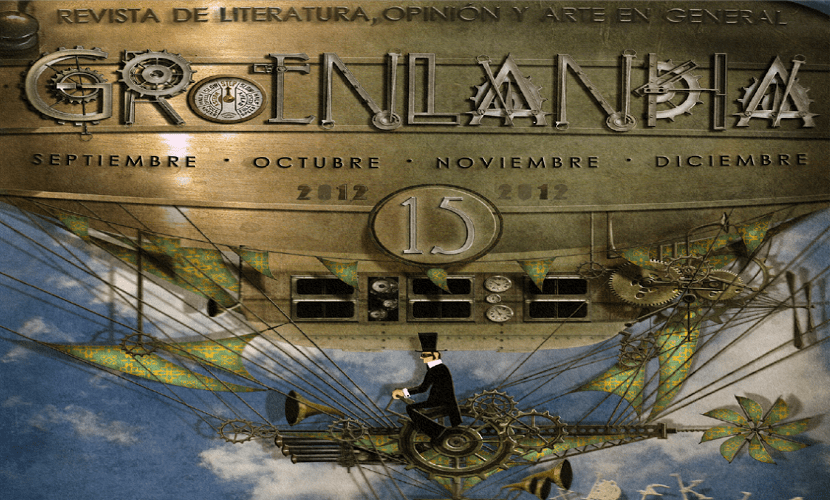
En Actualidad Literatura we have been fortunate to speak first hand with Ana Patricia Moya, director of the Greenland Magazine, a magazine of Opinion, Art and Culture in general. It was created by her and she managed to get ahead with a lot of effort and enthusiasm despite some difficulties she encountered along the way.
Without further delay we leave you what the interview gave of itself and the answers that Ana Patricia gave us to each of the questions that we proposed.
Actualidad Literatura: Good morning Ana Patricia, or would you prefer me to call you Periquilla Los Palotes? By the way, any special reason for that funny pseudonym?
Ana Patricia Moya: Lo de Periquilla is a nickname that an artist gave me a little "desperate" to stand out in the cultural world to refer to me, in an affectionate way, as a "nobody lady", "another one of the bunch" or "one that will not arrive to nothing". The Periquillas and the Fulanitos are (and please, I do not use both terms in a derogatory sense, because we all started this way) the new authors.
AL: We know that you are the creator of the Greenland Magazine and we would like you to briefly explain to us what year it was born and for what reasons you decide to create it.
MPA: It was six years ago. My objectives (shared by Bárbara, the deputy director of the project) were, first, to create a publication that would cover different artistic disciplines, second, to give space to new authors regardless of their literary curriculum, nationality or age, and third, of course, take advantage of the network to spread the word around the world.
The draft of the initial project was a printed magazine, but in the end, everything went wrong and it ended up in digital format: I suppose it was a wise decision because if it had been on paper, it would not have lasted long. It is undeniable that print has its charm, but it requires a lot of budget, and since we set ourselves up as a non-profit project, we got rid of the idea of requesting institutional aid for its development as this would imply limitations.
AL: Who can publish in Greenland and what requirements are needed a priori to be part of it?
MPA: Anyone who is interested can publish, as long as it meets quality requirements and is consistent with the fact that our publishing house is digital (for now), very modest and not seeking profit: all publications are for free reading and download. All kinds of proposals pass through our hands, be they poems or stories to be published in the magazine or supplement, or complete works. We have to be selective: you can't publish everything. We are clear, yes, that we do not even care about the author's literary curriculum, where he comes from or his age: we are going to value his work, ignoring the previous factors, because it is what is really important. There are unknown authors who are very good: we want to lean on them. And we want them to trust our work, even though it is especially digital.
AL: We have browsed both the magazine's website (http://www.revistagroenlandia.com/) and the numbers and supplements you have so far and we have realized that among the participants you make distinctions between “inhabitants” and “visitors”. What do they mean?
MPA: This distinction is no longer in use. Originally, it was a way of designating regular and casual participants. Most of the regulars, nowadays, make up the Greenlandic team (cover designers, photographers and illustrators, especially, also writers who give us their work to complete the works, such as writing prologues or epilogues, or proofreading tasks) . In its beginnings, the inhabitants had more "privileges": more pages to publish their work in the magazine, for example. But over the years we have realized that it is not a good idea to “corserate”: if a casual collaborator offers something very interesting and one more page is exceeded than allowed, we cannot just remove the poem, story or others because their collaboration slightly exceeds the space granted.
AL: Both the numbers and the supplements that you make are very "worked", should it take a great effort to make a magazine as complete as yours, right? Does someone help you with ordering, layout, etc.? What is the process when making it?
MPA: Most of the works have been coordinated, layout and designed by me; Of course, without the support of photographers, illustrators and graphic designers, I would not be able to produce such a complex and high-quality publication. The effort is titanic, I do not doubt it: in fact, this year the seventeenth magazine should have come out, but due to personal circumstances, it could not come out. Hopefully it will be out soon, although we are focusing on the editorial issue. In other words, everything depends not only on how I am on time, but also on the collaborators themselves, who have priorities. The process has several phases: selection of texts, division of the same (if they are incorporated in a supplement or magazine), design of templates for publications, layout, revision and publication.
AL: How often do you publish each issue?
MPA: Over the years, the frequency has changed: it is now annual. One magazine and one supplement per year. A pity, because before it was quarterly: shortage of means, no doubt. Let's hope to improve this aspect, as it is the most popular part of the project.

AL: If we take a closer look at the web we see that there are also published books. These books are in pdf format. and everyone can read them, but do you also make paper books? And if so, how could they be acquired?
MPA: The paper books are coming soon. I won't say anything else. Time to time. Let's not anticipate events, that about two years ago we were about to start the journey of printed books, but due to a bad personal decision (to bet on another publisher), I was left without financial means. You learn from mistakes, I guess. And I do not regret having committed it: one is wiser and knows what to expect. For this reason, the publishing world arouses a lot of mistrust in me: it is possible to do different things, but it is easier to do demagoguery and do exactly the opposite of what is said to look good with the reading public, very ignorant, at times, of what it happens behind the scenes.
AL: What is the present and future of Greenland?
MPA: The present is regular, precisely because this year has been one of the worst on a personal level, and as much of the weight of the project falls on me, because then, the appearance of publications is diminished, naturally. The future is promising: I know things will change next year. For good. I am too excited for the literary world and other scoundrels to snatch the fruit of my work and my desire to continue contributing my grain of sand to what I am passionate about, what I would like to turn into a vocation.
AL: Do you think there should be more projects like yours?
MPA: Exist. The problem is that they require a lot of dedication and effort: it is difficult to maintain it, because that is what it is about, to maintain. Erecting a project is easy: the difficult thing is that it survives. The good thing about independent projects is that they only depend on themselves, that is, on the will of their creators, not on other elements, that is, on public money, shameless cheating, and servitude between literary colleagues and the other bullshit that is so distilled. in this literary world.
AL: And if we talk about Ana Patricia Moya, in which literary genre is she most comfortable, what are her three favorite books, and what famous writer do you think should never have dedicated herself to writing?
MPA: I like the narrative better: it is a challenge to write stories or stories, more than poetry, which is still a feeling expressed in words. My three favorite books are “Lolita”, by Nabokov, “La casa de los espíritus”, by Isabel Allende, and “Romances de andar por casa”, by Carlos Giménez (the latter is a comic). The last question you ask me sounds like a cheat, so I'll say the following: less climbing and more writing. Too many famous writers are more eager to rise than to write, getting into politics or sympathizing with certain parties, rubbing shoulders with influential people in the literary world, interestedly reaching out to editors and other writers for profit. They are not famous then for their work, but for their personal relationships and position. Because that's the important thing: writing. The rest is not literature.
AL: Thank you very much Ana Patricia, on behalf of the entire team at Actualidad Literatura, for answering the arsenal of questions. It was a pleasure to have you for this collaboration.
MPA: Thanks to you.